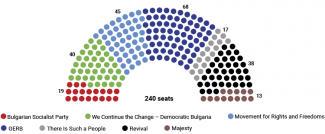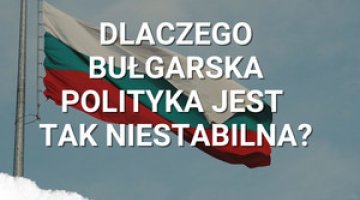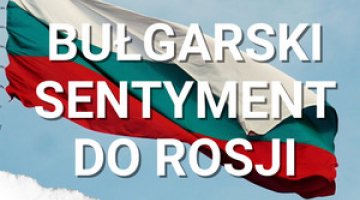Snap election in Bulgaria: a worsening political crisis and a strengthening radical right
On 9 June, alongside the European Parliament elections, Bulgaria held snap elections for the 240-member National Assembly, the sixth since 2021. Once again, the vote failed to produce a definitive outcome.
The winner is the centre-right GERB party led by former Prime Minister Boyko Borisov, which garnered 24.7% of the votes, or 68 seats. The Movement for Rights and Freedoms (DPS) came second with 17.1% support, earning 45 seats. The centrist-liberal We Continue the Change–Democratic Bulgaria (PP–DB) coalition led by former Prime Minister Kiril Petkov came third with 14.3% of the vote, resulting in 40 seats. Other parties that made it into parliament include the pro-Russian and nationalist Revival party, which garnered 13.8% of the vote and 38 seats, the Bulgarian Socialist Party (BSP) with 7.1% and 19 seats, the populist party There Is Such a People (ITN) with 6.0% and 17 seats, and the far-right party Majesty (Velichie), debuting in the National Assembly with 4.7% of the vote and 13 seats. Voter turnout was 33%, the lowest in Bulgarian parliamentary history since 1989.
Commentary
- The most likely scenario is that a government coalition will be formed by GERB, DPS and ITN, as this would have a majority with 130 seats. If these parties fail to reach a compromise, the country’s political chaos will continue in the coming months; Bulgaria will again be governed by interim cabinets, and another snap election will have to be held (for more details, see ‘A country of interim governments. The political crisis in Bulgaria and the attempts to solve it’). GERB has the most consistently stable electorate and will have nearly the same number of MPs in parliament as in the previous elections in 2022 and 2023. It is impossible to maintain a stable majority without GERB’s participation. PP–DB, which until recently was in a ruling coalition with GERB, has lost about one-third of its seats. In the opinion of many voters, the PP–DB’s participation in the rotating government alongside GERB last year has damaged its image as a reformist and anti-corruption party, and the group’s internal crisis is postponing the prospects for major reforms in Bulgaria.
- However, cooperation with any of the two potential coalition partners, DPS and ITN, carries significant risks for Borisov’s GERB party. This election has been quite successful for DPS, which primarily relies on the Turkish minority’s votes. This party has rarely been part of governments; its usual strategy is rather to support coalitions in crucial votes in exchange for senior positions in government agencies and parliamentary committees (especially those overseeing the security sectors). The co-president of this party, Delyan Peevski, has been under American and British sanctions for several years due to involvement in corruption. ITN would also be a challenging coalition partner for Borisov’s party due to the unpredictability of its leader, Slavi Trifonov, whose decision to leave the coalition led to the collapse of the government in 2022.
- The Pro-Russian parties who are opposed to providing aid to Ukraine and question Bulgaria’s NATO membership will have more representatives in the new parliament. Alongside the far-right Revival party, which repeated its strong performance from previous elections, Majesty, which used to be a niche party, unexpectedly made it to the parliament. This party promotes anti-establishment slogans and is led by far-right activists and former secret service officers, many of whom were previously associated with Revival, and to some extent with ITN. One prominent figure is Nikolay Markov, the founder of the internet group ‘Free and Peaceful Bulgaria’, which had over 30,000 users shortly after its inception in 2022, and called for participation in protests against sending military aid to Ukraine.
Chart 1. The distribution of seats in the National Assembly following the snap parliamentary elections on 9 June

Source: cik.bg; dnevnik.bg.
Chart 2. Results by parties

Source: cik.bg; dnevnik.bg.




